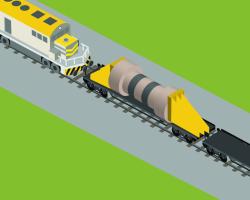Category of Content
Siting Experience Documents Only
Publication Date
Subject Matter
Keywords
Insight from Public Surveys Related to Siting of Nuclear Waste Facilities: An Overview of Findings from a 2015 Nationwide Survey of US Residents
Insight from Public Surveys Related to Siting of Nuclear Waste Facilities: An Overview of Findings from a 2015 Nationwide Survey of US Residents
Design and Prototype Fabrication of Railcars for Transport of High-Level Radioactive Material; Phase 3 - Prototype Fabrication and Delivery
Design and Prototype Fabrication of Railcars for Transport of High-Level Radioactive Material; Phase 3 - Prototype Fabrication and Delivery
Appendix A – Design Changes Due to the Addition of the HI-STAR 190 Casks
Appendix A – Design Changes Due to the Addition of the HI-STAR 190 Casks
M3SF-21PN020401053- COBRA-SFS Version 6.1 User Guide- A Thermal Hydraulic Analysis Code for Spent Fuel Storage and Transpor
M3SF-21PN020401053- COBRA-SFS Version 6.1 User Guide- A Thermal Hydraulic Analysis Code for Spent Fuel Storage and Transpor
M4SF-19ID020303045- Atlas Railcar Phase 3 Final Report
M4SF-19ID020303045- Atlas Railcar Phase 3 Final Report
Performance Specification for Standardized Transportation, Aging, and Disposal Canister Systems
Performance Specification for Standardized Transportation, Aging, and Disposal Canister Systems
Appendix B – Revised Railcar-to-Cradle Attachment Interface
Appendix B – Revised Railcar-to-Cradle Attachment Interface
Appendix D – Revised Conceptual Cradle Design Family 4
Appendix D – Revised Conceptual Cradle Design Family 4
Standardized Transportation, Aging, and Disposal Canister Feasibility Study
Standardized Transportation, Aging, and Disposal Canister Feasibility Study
The Social and Ethical Aspects of Nuclear Waste
The Social and Ethical Aspects of Nuclear Waste
Nuclear waste management seems to exist in a perpetual state of crises. For 50 years the nuclear states of the world have fought, and generally lost, the battle to deal with the nuclear waste problem. Worldwide, there is a growing acknowledgement within industry and government that social and ethical issues are just as important as technical issues when developing safe programs for nuclear waste management. This paper is a review of some of the outstanding social and ethical issues that are influencing discussions on nuclear waste management around the world.
Transportation Planning: Indigenous Dialogue
Transportation Planning: Indigenous Dialogue
In 2019, the NWMO commissioned Maawandoon Inc to lead Indigenous Dialogue session to support NWMO’s transportation planning for the long-term care of Canada’s used nuclear fuel. This research built upon and complemented public attitude research carried out in 2017 and 2018. The research methodology consisted of 7 Indigenous dialogue sessions and attendance at 3 Indigenous Annual General Assemblies (AGA)/meetings with dialogue components.
Views and Attitudes toward Nuclear Waste: National Survey Final Report
Views and Attitudes toward Nuclear Waste: National Survey Final Report
In 2002, the federal government passed a law to create the Nuclear Waste Management Organization, also known by its initials NWMO. The Nuclear Waste Management Organization (NWMO) was established by Ontario Power Generation Inc., Hydro-Québec and New Brunswick Power Corporation in accordance with the Nuclear Fuel Waste Act (NFWA) to assume responsibility for the long-term management of Canada’s used nuclear fuel. More specifically, the NWMO’s initial objective was to recommend a long-term approach for managing used nuclear fuel produced by Canada’s electricity generators.
Going the Distance? The Safe Transport of Spent Nuclear Fuel and High-Level Radioactive Waste in the United States - Summary
Going the Distance? The Safe Transport of Spent Nuclear Fuel and High-Level Radioactive Waste in the United States - Summary
This new report from the National Research Council’s Nuclear and Radiation Studies Board (NRSB) and the Transportation Research Board reviews the risks and technical and societal concerns for the transport of spent nuclear fuel and high-level radioactive waste in the United States. Shipments are expected to increase as the U.S. Department of Energy opens a repository for spent fuel and high-level waste at Yucca Mountain, and the commercial nuclear industry considers constructing a facility in Utah for temporary storage of spent fuel from some of its nuclear waste plants.
Transportation Institutional Issues Involving the U.S. Department of Energy's Civilian Radioactive Waste Management Program: The Post Yucca Mountain Years
Transportation Institutional Issues Involving the U.S. Department of Energy's Civilian Radioactive Waste Management Program: The Post Yucca Mountain Years
This 10th anniversary update to the original archive adds several sections that cover relevant topics since 2010. Some of the new topics include the Blue Ribbon Commission on America's Nuclear Future, consent-based siting, tribal engagement, shutdown site visits, and industry interests. Much like the first publication, the purpose of this update is to make it easier for new personnel to learn about what came before them in the hope that this knowledge gives them a greater chance of success.


